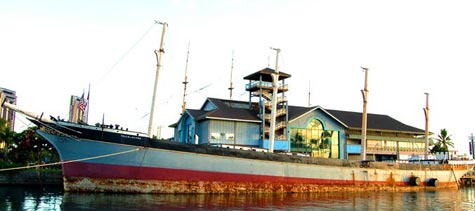 Last week, the State of Hawai’i Department of Transportation issued a statement that the windjammer Falls of Clyde, the only remaining iron-hulled four-masted full-rigged ship and the only surviving sail-driven oil tanker in the world, would soon be delisted from the Hawaiʻi Register of Historic Places. The statement noted that “this step is not at all a reflection of the vessel’s important history.”
Last week, the State of Hawai’i Department of Transportation issued a statement that the windjammer Falls of Clyde, the only remaining iron-hulled four-masted full-rigged ship and the only surviving sail-driven oil tanker in the world, would soon be delisted from the Hawaiʻi Register of Historic Places. The statement noted that “this step is not at all a reflection of the vessel’s important history.”
The Department of Transportation stated that the delisting is intended “to facilitate the disposition of the vessel and prepare for the issuance of a new Request for Proposals (RFP) for its removal from the harbor.”
The statement also notes that the Hawaiʻi Department of Transportation (HDOT) is working to redevelop Pier 7 at Honolulu Harbor which has been vacant and inactive for the last 14 years, after Bishop Museum closed the Hawaiʻi Maritime Center. One of the challenges to redevelopment has been the disposition of the Falls of Clyde—the historic vessel that was gifted to the museum—which remains moored at Pier 7.
A condition assessment of the vessel conducted in March 2023 revealed that the structural integrity of the Falls of Clyde has deteriorated substantially over the years. The assessment is available here. HDOT currently pays a contractor to regularly monitor water levels and pump water from its hull. Without this intervention, the ship would likely sink, list, or damage surrounding facilities.
We understand that some members of the public will be disappointed by the vessel’s removal from Honolulu Harbor, but we remain open to supporting the ship’s owner, Friends of Falls of Clyde, partnering with an entity that can both remove and preserve the property.
Launched in 1878 in Port Glasgow, Scotland, for her first twenty years, the Falls of Clyde served as a British merchantman in the India trade. She was then purchased by Matson Navigation and brought to Hawaii. From 1899 to 1907, she made over sixty voyages between Hilo, Hawaii, and San Francisco, California, carrying general merchandise west, sugar east, and passengers both ways.
In 1907, the Associated Oil Company (later Tidewater Oil) bought Falls of Clyde and converted her to a bulk oil tanker with a capacity of 19,000 barrels (3,000 m3). Ten large steel tanks were built into her hull, and a pump room, boiler, and generator fitted forward of an oil-tight bulkhead.
